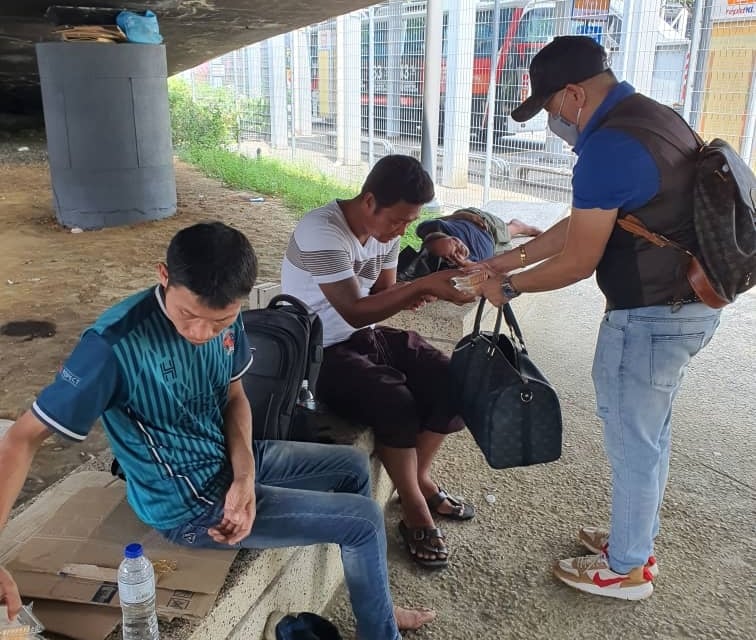Humanitarian Mission


Our mission
Author: Tan Sri Son
Homelessness in Kuala Lumpur: A Hidden Crisis and the Fight to End It
Kuala Lumpur, Malaysia’s capital city, stands as a symbol of development and economic ambition. With its dazzling skyline and high-end malls, the city seems full of promise. Yet, beneath this modern image lies a harsh reality—a growing population of homeless individuals, or gelandangan, struggling to survive in back alleys, beneath flyovers, and along the sidewalks. While economic inequality and social exclusion fuel this crisis, the efforts of civil society, including organizations like the 1Hope Foundation, have become a beacon of hope in restoring dignity and rebuilding lives.
Understanding the Faces Behind Homelessness
The homeless in Kuala Lumpur are not all the same. Some are elderly and abandoned, some are young people fleeing broken homes, others are former prisoners or people with mental illness. Many were once employed, with families and homes, but lost everything due to illness, job loss, or domestic issues. The COVID-19 pandemic further accelerated homelessness by displacing thousands of informal workers and daily earners who had no savings or safety nets.
Root Causes of Homelessness
1. Urban Poverty – The high cost of living in Kuala Lumpur makes it difficult for low-income earners to afford rent, food, and healthcare.
2. Lack of Affordable Housing – There is a shortage of accessible low-cost housing for the urban poor, and many homeless people lack documentation needed to apply for government housing programs.
3. Unemployment and Job Instability – Daily wage earners often face job insecurity. When work stops, so does shelter.
4. Mental Illness and Addiction – Many homeless individuals struggle with untreated mental health issues and substance abuse, often lacking support or access to care.
5. Family Breakdown and Abuse – Some become homeless after escaping abusive households or being cast out due to family disputes or neglect.
1Hope Foundation’s Humanitarian Response
Amid these challenges, the 1Hope Foundation has emerged as one of the leading humanitarian organizations working tirelessly to combat homelessness in Kuala Lumpur. Founded on principles of compassion, dignity, and action, the foundation has been instrumental in bridging the gap between the forgotten and the supported.
Key Initiatives by 1Hope Foundation:
Street Feeding Programs: The foundation regularly distributes hot meals, bottled water, and hygiene kits to the homeless in key locations around Kuala Lumpur such as Jalan Tuanku Abdul Rahman, Pudu, and Chow Kit.
Emergency Shelter Access: Through partnerships with shelters and temporary hostels, 1Hope helps individuals find safe places to sleep—especially women, the elderly, and those with chronic illnesses.
Medical Outreach and Referrals: With the help of volunteer medical teams, 1Hope conducts health screenings and refers homeless individuals to clinics and hospitals for further treatment.
Job and Skills Support: 1Hope supports skills development and small-scale job placements by working with local businesses, helping former homeless individuals transition back into working life.
Public Awareness and Advocacy: The foundation raises awareness about homelessness through social media campaigns and community events, challenging the stigma and encouraging empathy and civic responsibility.
Response During Crises: During the pandemic and monsoon floods, 1Hope expanded its reach, providing emergency aid, masks, sanitizers, and temporary accommodation to hundreds affected by both homelessness and disaster.
Through these initiatives, 1Hope Foundation has not only offered relief and protection, but also restored a sense of belonging and self-worth to those often seen as invisible.
Broader Government and NGO Efforts
The government, through programs such as Anjung Singgah and eKasih, aims to reduce homelessness through temporary shelters and financial assistance. Kuala Lumpur City Hall (DBKL) also coordinates outreach and supports welfare efforts. However, bureaucracy, resource limitations, and identification issues continue to hinder long-term solutions.
Other NGOs like Kechara Soup Kitchen, Pertiwi, and Dapur Jalanan also play vital roles in daily food distribution and advocacy. But the growing numbers show that civil society cannot solve the problem alone—systemic reform is needed.
The Path Forward
To truly address homelessness, Malaysia must take a comprehensive, inclusive, and compassionate approach:
Expand affordable housing options and ease documentation barriers.
Invest in mental health services and addiction recovery support.
Create clear job pathways and vocational programs for the homeless.
Strengthen partnerships between the government and grassroots organizations like 1Hope.
Educate the public to break stigma and encourage community-based support.
Conclusion
Homelessness in Kuala Lumpur is not just about lacking a roof—it is about being excluded from society’s care and compassion. It is about the heartbreak of being overlooked in a city full of lights. Organizations like the 1Hope Foundation remind us that behind every homeless person is a story, a name, and a right to live with dignity. In the end, the success of a city is not measured by its buildings, but by how it treats its most vulnerable.
Humanitarian Stories
We started as a small interior design

Discover our full library of The Theos e-magazines and articles — all completely free to read.
We are a crowdfunded publication, dedicated to sharing knowledge, reflection, and theology with readers around the world.
Your support and donations help us continue offering open, accessible content for everyone, everywhere.
Join us in keeping wisdom free.
@ the theos since 2023 © 2023. All rights reserved.